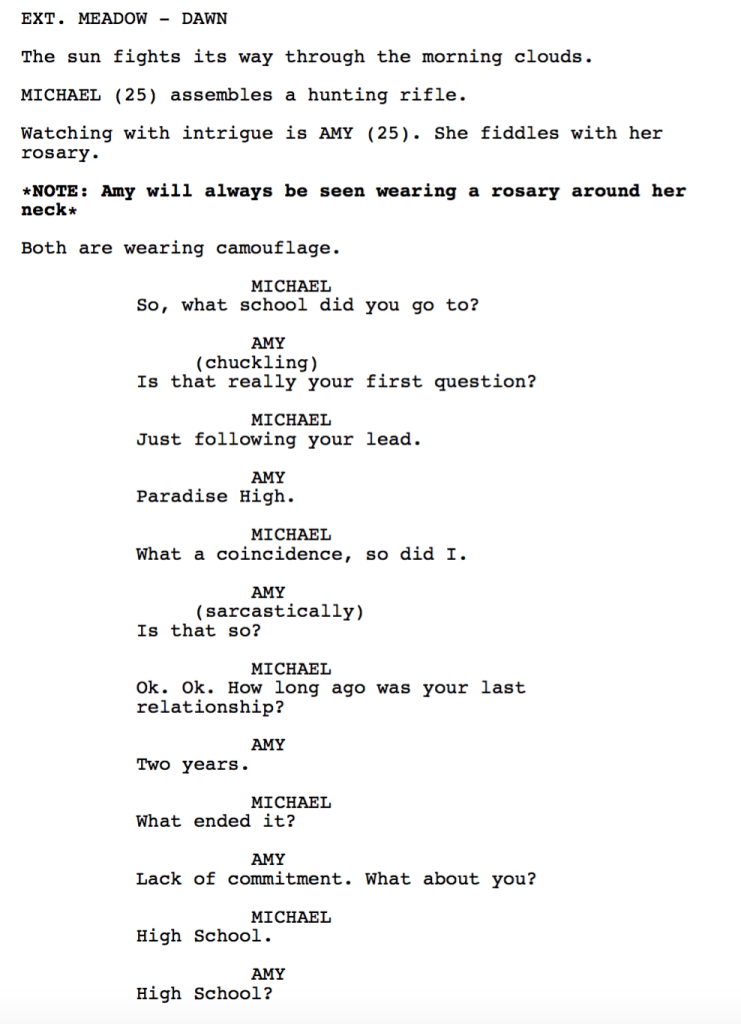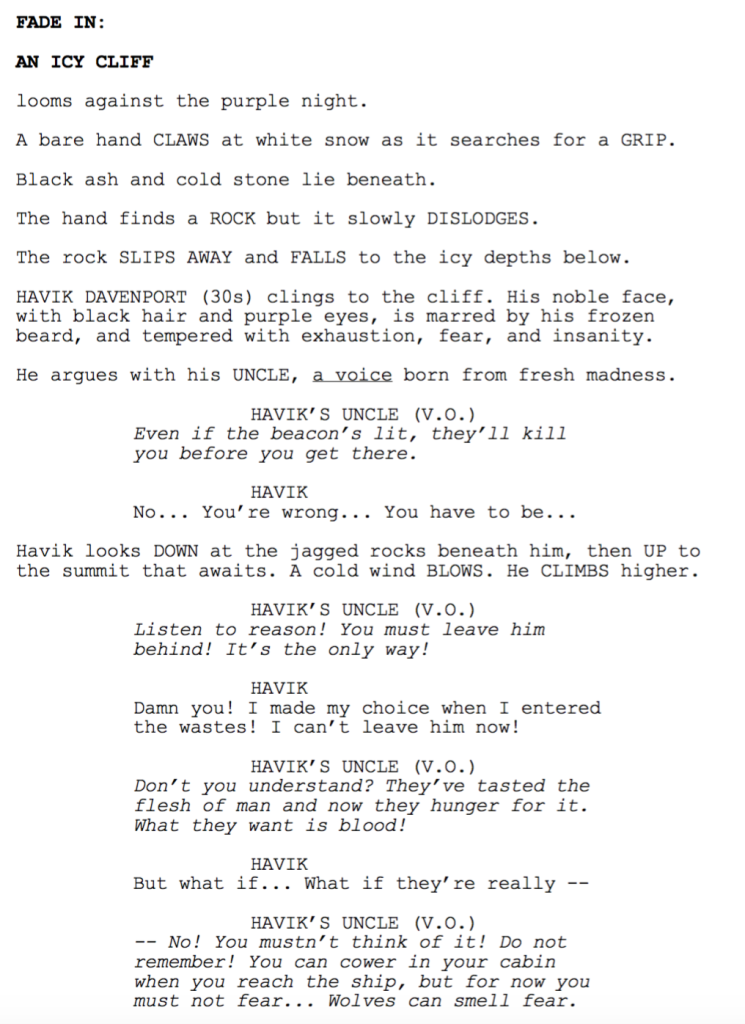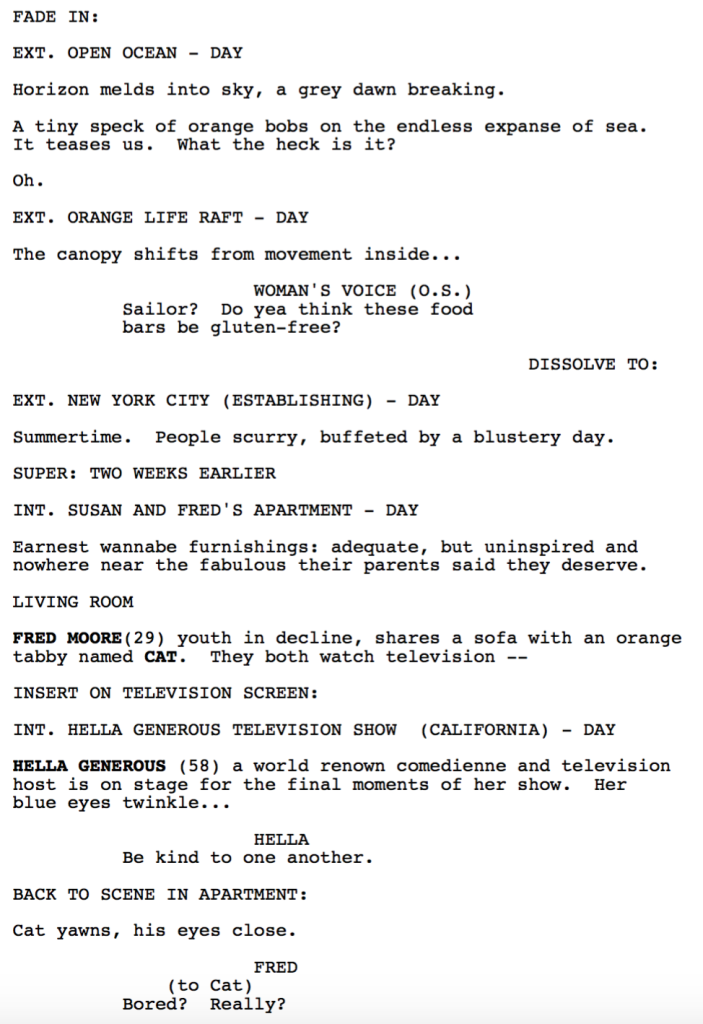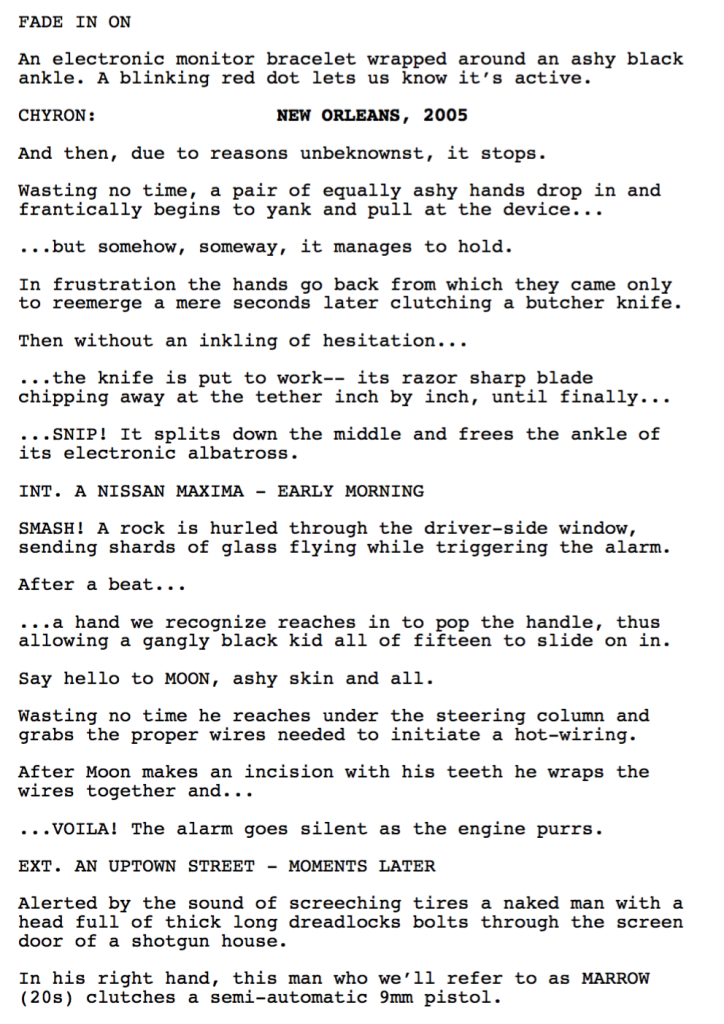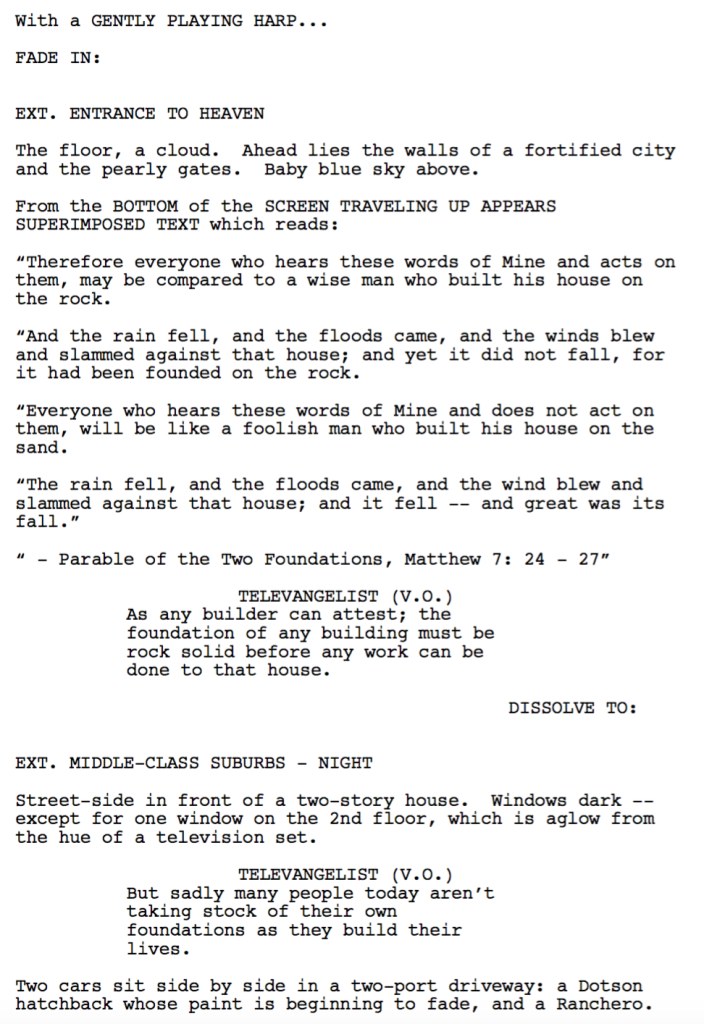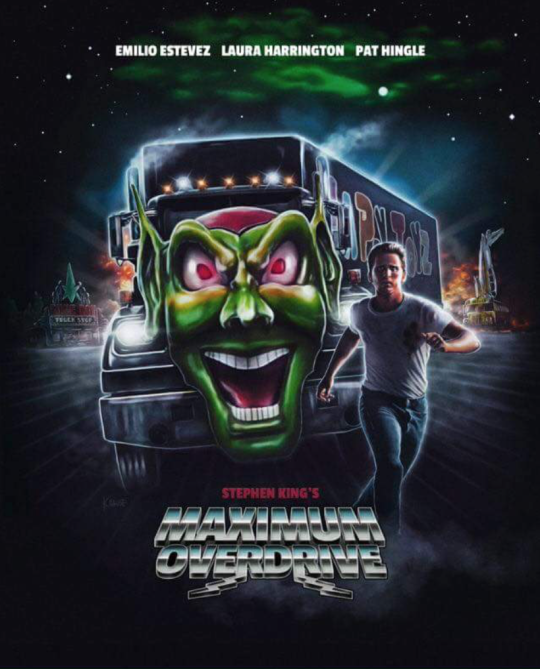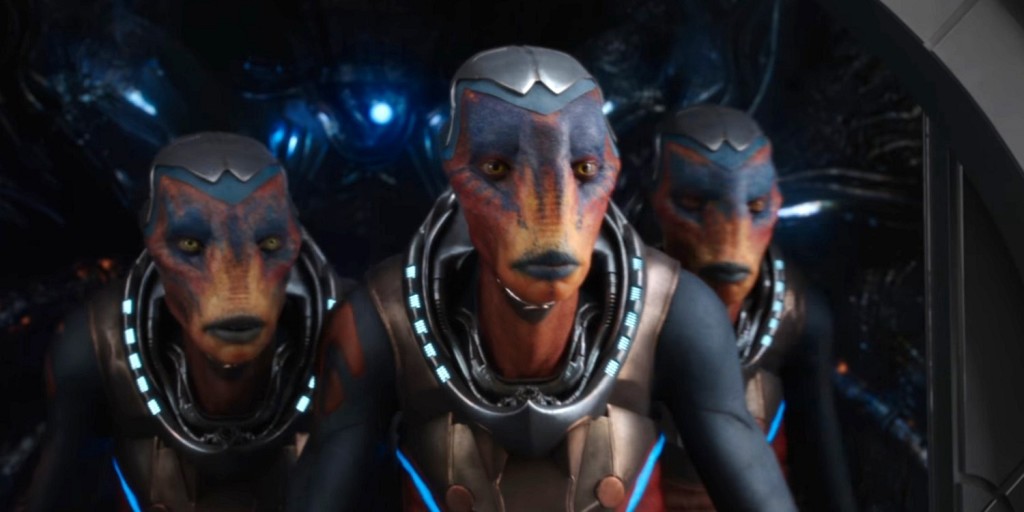Congratulations to Michael Harper and his script “Hellpig,” which received a “WORTH THE READ” yesterday, no small feat for an amateur script. We’ve been getting lots of good scripts lately. And that’s all you guys. The writers writing these scripts and the diligent Scriptshadow readers who are reading and voting for them. This doesn’t happen anywhere else on the internet so it’s a cool process to see. You all deserve a giant thank you.
Okay, enough ass-kissing. It’s time for a new batch of scripts. Here’s how to play: Read as many of this weekend’s scripts as you can and VOTE for your favorite in the comments section. Winner gets a review next Friday.
If you’d like to submit your own script to compete on Amateur Offerings, send a PDF of your script to carsonreeves3@gmail.com with the title, genre, logline, and why you think your script should get a shot. Good luck!
Title: Invasion
Genre: Sci-Fi, Drama
Logline: Presumed dead, a man returns home claiming to have been abducted by aliens, and warns that they are planning a large scale attack. Deemed insane, he decides to start a survivalist camp dedicated to fighting the impending invasion.
Why You Should Read: I’ve always wanted to write a movie about aliens, but I wanted to find a unique way to make it stand out from all the rest. I believe I’ve achieved that. A reader compared “Invasion” to the critically acclaimed “Stranger Things”, being that both manage to operate as a higher scale sci-fi piece and a family drama. At its heart, this is a love story about the lengths we will go to protect those we love, no matter how insurmountable those odds may be.
Title: Dead Star
Genre: Horror
Logline: When a Polar expedition awakens a sleeping god and unleashes doom upon the world, its only survivor is stalked by wolves across a snowy wasteland as he struggles to make it back to his ship alive.
Why You Should Read: Dead Star is GAME OF THRONES meets THE THING. In the spirit of a confined horror, the rich mythology of a foreign world unfurls as you accompany an anti-hero who believes only in science and what he can see with his own eyes. And as the paradigm of his world collapses, and he finds himself slowly but surely believing in the impossible, we experience right along with him his fearful descent into madness as he tries to outwit a god-like villain unlike any you’ve ever seen before.
Title: Let’s Be Famous
Genre: Adventure comedy
Logline: After two fame-seeking Millennials are outed for their plans to fake a sailing adventure blog, no one believes it when they really are ship-wrecked and lost at sea.
Why You Should Read: The first half of the story pokes fun at our obsession with fame and lampoons our dependence on smart phones. In the back half I play with what might happen when you take away the phones. Do we remain tethered to societal whims and expectations? Or do we gain clarity about who we are and what we really want?
I took some chances with the back half. Yes, indeedy. Curious if it works.
Thanks ahead of time to all who check it out!
Title: Quiet Storm
Genre: Crime Drama, Coming of Age
Logline: After discovering a stash of drugs during a carjacking a deaf teen delinquent finds himself pursued by crooked cops as Hurricane Katrina approaches.
Why You Should Read: I’ve received some high marks recently on this– including an overall eight (as well as six sevens) from the Blacklist– and earlier drafts have placed in various contest including all the biggies: Nicholl, Scriptpipline, American Zoetrope, Page, etc. So now I’m hoping to use this as a writing sample to land a rep.
Title: A Heart Built on the Sand
Genre: Urban Drama
Logline: The ideal life being striven for by a sexually charged woman in her 40s gets put to the test by the men that she loves and the demands of her job.
Why Carson should review this script? He owes me this. Back when he had a guantlet challenge I sent this script to him to challenge Allan Ball’s “American Beauty” (1999: directed by Sam Mendes) — and my challenge got discarded by him. But now I just wanna get this script in the hands of Niccole Kidman so I can be the scribe who helps her win an Oscar for best actress. Original idea for this script was a woman undone while the song “Tall Cool One” by Robert Plant plays.
One last thing. If you didn’t open a script because of what you read on one of the first pages above, take a moment and tell the writer why you chose not to open their script. Be truthful but polite about it. Remember, most writers go through life having no idea what people really think about their stuff. So they don’t know what to fix. Help these writers become better! :)
Genre: Horror/Comedy
Premise: When pipeline construction encroaches on its pristine Dakota Badlands territory, a giant prehistoric pig creature unleashes hell on a group of unsuspecting humans, who must band together in order to survive.
Why You Should Read: Longtime SS lurker here, ready to throw my script into the pit. Hellpig is a heapin’ helpin’ of action, gore and camp with a Sharknado tone, a unique monster and buckets of blood. Thanks to Carson and everyone for the opportunity and the reads.
Writer: Michael Harper
Details: 96 pages
It’s awfully funny.
Just yesterday I was watching Maximum Overdrive, the Stephen King directed film that was featured in the script I reviewed Wednesday. That film exists in the same universe as Hellpig. And despite being written by someone who doesn’t yet have a produced credit, much less 40 best selling novels, I gladly contend that Hellpig is better than that film.
How much better? After Scriptshadow’s own, Steph Jones, came up with the script’s tagline (“Go pig or go home!”), I’d say it beat the King debacle by a full lap.
But let’s be honest. Maximum Overdrive is hardly a cinema classic. Which means Hellpig hasn’t yet secured a passing grade. Let’s lift the cover off this pig in a blanket and see if it passes the ultimate test – the ‘squeal like a pig’ test.
45 year-old Walt Harvey is the most hated man on the planet. He’s one of those big game hunters who kills animals then takes douchey pictures with them before blasting the pictures all over social media. His latest conquest was a hippopotamus, which he and his camo-covered wife took down.
When rumor hits the street that the hippo was old and possibly fenced-in, however, Walt looks like a ten-ton asshole. The only way to redeem himself, in his mind, is to kill a 16-point elk, which he’s looking for in the heart of South Dakota.
Nearby, Harlan Hawes runs a Christian Rehabilitation Youth Academy that’s got four new members. There’s 17 year-old Max, who’s got a gambling problem, 17 year-old Kaci, who’s been suckin face with multiple men. There’s Doyle Choi, a 16 year old Korean pyromaniac. And 18 year-old Jed, a rich kid who steals anything he can get his hands on.
Harlan’s plan is to escort (force) them into the forest and rid their bodies of Satan. Little do any of these people know that a giant Hellpig is in the vicinity, burping out a new kill every few hours. Hellpig is not some made-up monster either, but a real pig that used to exist hundreds of thousands of years ago. Everyone assumed they went extinct. They were wrong. There’s a new brand of pepperoni in town.
Our hunters and rehabilitators eventually run into each other, and when Hellpig kills Walt’s wife, it’s game on. He’s getting revenge. Or maybe looking for fame. It’s hard to pinpoint which motivation drives him more. All our misfits know is that they want to get as far away from this killing machine as possible, but can’t because Lunatic Walt keeps taking them closer.
What Walt doesn’t realize is something everyone else knew the second they looked into this monster’s eyes: This is one piece of bacon that can’t be cooked.
What surprised me the most about Hellpig was how seriously Harper took the subject matter. You see the title “Hellpig” and you expect, well, Maximum Overdrive with pigs. But you can tell a lot of thought went into this. Three entire scenes are dedicated to the backstory of Hellpig.
Now you may say, “Carson, you tell us backstory is bad. Backstory slows the script down.” This is true EXCEPT when the backstory is interesting. Sure, if you’re telling me Mikey got a beating by Daddy’s hand when he used to come home late from school as a child, I don’t want to hear that. But if you’re telling me about a pig that used to be a fucking dinosaur that went extinct hundreds of thousands of years ago – I want to hear more of that.
I knew I was in good hands early when an oil pipeline subplot was introduced. This may seem pointless at first glance. But by adding that plotline, you’re telling the reader, “I’m not just going to give you 90 pages of a pig that looks like the devil tearing people apart. There’s going to be more to this.” And there was.
For starters, you know that old screenwriting tip everybody says you should do but nobody actually does? How you should be able to black out all the character names yet still know which character is speaking? In other words, each character sounds so distinctive that we don’t even need to see their name to know who’s talking? Well you can do that here.
Walt is always pissed off about not being taken seriously as a hunter. Max is always making some wise-crack or betting other campers about something. Kaci is always trying to get in Max’s pants. Harlan doesn’t say a single sentence that doesn’t include “God” or “Satan.” These distinctions created a legitimate variety of characters, and not just generic Hellpig victims.
Also, yesterday we focused on the power of conflict. There’s a major conflict lesson right out of the gate in Hellpig. These four teenagers have been FORCED to go to this Hawes Christian Youth Academy and participate in something they don’t want to do. Therefore, before we’ve even SEEN Hellpig, we ALREADY HAVE CONFLICT.
Beginner writers ask me all the time: How do you know the difference between professional and amateur writing? Well, it’s choices like this one. When you create situations that include conflict before the main source of conflict even enters the story? That means you know how to write a screenplay.
As far as negative feedback, I would encourage Harper to give us more of the teenagers. As much as I liked them, there wasn’t enough of’em. All the focus was going to Walt and his hunting crew. And while Walt was funny to carry all those scenes. So were the kids. Since the groundwork is already laid out, all you’d have to do is give them more screen time. I mean Doyle shouldn’t die before we even got to know him.
Otherwise, this was a really solid Amateur Friday entry. You guys continue to do a good job of finding the best material out of the scripts presented. Thanks a lot for that. It makes my job a lot easier.
To all of you I say… Oink. Oink Oink……. Oink.
Script link: Hellpig
[ ] No squeal at all
[ ] Barely a squeal
[x] Squealed like a pig
[ ] Squealtacular
[ ] Golden Squeal
What I learned: Once you’ve identified the location you’re going to place your story in, research that location to come up with plot points and set pieces that are unique to that area. This will help set your story apart from others. I loved that we were dealing with the oil pipeline, a South Dakota specialty at the moment. Or that we ran into an old Native American cemetery, South Dakota being rich in Indian reservations.
So maybe I was a little bit of an ageist yesterday. Picking on a script because it was written by a 22 year-old. The script had made mistakes, I claimed, that only a young writer would make. That was some proper-ass stereotyping I was doing. That’s not cool, Carson.
But it was true.
In revisiting my Maximum King reading experience, I further realized why the script had missed the mark. It was completely devoid of any conflict. The reason that tends to be a young writer mistake is that younger people haven’t experienced the pushback from life that a longer living experience gives you. You don’t truly realize how difficult life is until you’re thrust out into it and it does everything in its power to beat you down.
From the very first scene in Maximum King, conflict appears to be an afterthought. Someone comes to Stephen King and says, “Do you want to make a movie?” To the uninitiated screenwriter, you look at that and go, “So what?” To people who understand drama, they know that that’s the worst way you could possibly start a story. One of the most sought after and hard-to-get jobs in America – directing a movie – is just HANDED to our hero?? He didn’t have to do anything for it but exist??? That’s not drama. That’s boring.
But I’ll give you the moment that confirmed to me that this screenplay was screwed. I knew after this scene that the writer didn’t understand the concept of conflict. And since conflict is the whole ball of wax in screenwriting, the future looked grim.
The scene in question has Stephen King deciding he wants to hire AC/DC to score his movie. Why? Because they’re his favorite band. Had they ever scored a movie? No.
You would think, then, that this would be the perfect opportunity for conflict. Stephen King goes to his heroes, asks them to score his movie, and they say “No. We’re not movie composers. We’re a hard rock band. Go fuck yourself.” And Stephen King would then have to CONVINCE them to do it. The scene almost writes itself.
Instead, we get this…
“So you want us to—“
“Write an original soundtrack for the movie, back to front, yes.”
“And the movie is about—“
“Right, trucks— no, well, not just trucks but all machines, because a comet passes over Earth and causes all the machine to—“
“Sure, come to life.”
“Exactly.”
“Well shit, I guess I’m the fuck on board. I love your writing, and Brian is a huge fan of Carrie, so.”
Brian agrees.
“Great.”
“Great.”
Do you see how boring that scene is? Do you see how it could’ve potentially been a lot better had they told King no? I mean that early line is practically begging for a no. “And the movie is about…” “Right, trucks— no, well, not just trucks but all machines, because a comet passes over Earth and causes all the machine to—“ Long pause. “Dude, that doesn’t make any fucking sense. How the hell are we supposed to write music to that?” And King now has to convince them.
Nope. Didn’t get that.
So that’s today’s lesson. It’s simple yet powerful.
JUST SAY ‘NO’ TO YOUR HERO
Your protagonist will want a lot of things in a movie. He might want a raise. He might want sex from his wife. He might want to sell milkshake makers to fast food restaurants. He might want more attention from his parents. He might want to go with his dream girl to prom. He might want to explore an island he believes contains a giant ape. He might want his daughter to start eating dinner with the family again.
Say no.
Have all those people say no to your hero.
Because when you say no, that’s when things get interesting. That’s when your character has to work for it. And work means action, which leads to uncertainty, which leads to audience curiosity (“Is he going to succeed or fail!?”). And that’s when you’ve got us. Cause we have to stick around to see what happens.
The second someone says, “Yes?” None of that can occur. There’s no uncertainty at all. And that’s boring.
It should be noted that I’m not just talking about LITERAL “No’s.” I’m talking “no’s” in every form and fashion. An open door is a ‘yes.’ A locked door is a ‘no.’ An equation solved quickly is a ‘yes.’ An equation your hero can’t figure out is a ‘no.’ A surgery that goes well for your hero is a ‘yes.’ A surgery that goes badly, setting your hero back, is a ‘no.’
Your screenplay should be one giant series of “NO’S.”
I challenge you right now to go through your current screenplay, find a scene where your hero is allowed to waltz right through without any issues at all, and instead, add a “NO” to that scene. Throw a big fat hard NO into his face and make him work for that objective. I guarantee you the scene gets a lot better.
Carson does feature screenplay consultations, TV Pilot Consultations, and logline consultations, which go for $25 a piece of 5 for $75. You get a 1-10 rating, a 200-word evaluation, and a rewrite of the logline. If you’re interested in any sort of consultation package, e-mail Carsonreeves1@gmail.com with the subject line: CONSULTATION. Don’t start writing a script or sending a script out blind. Let Scriptshadow help you get it in shape first!
Genre: Biopic
Premise: Based on a “sorta true story” (going off the title page), Maximum King! is a surreal imagining of how in 1985 Stephen King wrote and directed his horror classic MAXIMUM OVERDRIVE.
About: Got an interesting one for you today. Today’s writer is 23 year-old Shay Hatten. You heard me right. TWENTY-THREE YEARS OLD. Last year, when Shay was just 22 years old, he made the Black List with this script. Why is this relevant? Well, this week, Shay just sold his first script, Ballerina. Why is this relevant? Because Ballerina is a female-centric hitman script that will now become a part of the John Wick universe. That’s a pretty big deal for a 23 year old. I’m sure Ballerina will pop up in time. But for right now, we’re going to take a look at Shay’s first script.
Writer: Shay Hatten
Details: 114 pages
Scriptshadow can be discouraging at times.
I spend a lot of time telling you guys how hard it is it write a good screenplay. How it takes years – YEARS! – to break in. For most screenwriters, 7 years is the ground floor. And that’s if you’re lucky.
As we all know, when you’re young, dumb, and full of puns, 7 years doesn’t work for you. You want your success NOW. You want to be the exception to the rule.
Well here’s some motivation for you. Today’s writer got onto the Black List with a script that he wrote when he was just 22 years old and still a college student! He followed that up with a script sale a year later that will be a part of one of the fastest growing franchises in Hollywood – John Wick.
Remember when I told you guys that you needed to be writing female John Wicks. This is the 4th, by my count, female John Wick script to sell, with another hitting theaters this weekend (Atomic Blonde). I wouldn’t say that the trend is over yet. But you figure they can only make so many of these. So if you’re writing a female John Wick script, hurry up!
It’s 1985 and Stephen King is just 36 years old. We’re introduced to the writing legend doing what he does best. No, not write, silly. SNORT COKE! There will be a lot of coke-snorting in this movie. A lot.
King has just thrown a brand new manuscript on his agent’s, Dan Jansen, desk about a gypsy who curses a man to grow forever thinner. Dan’s not sure what to make of the idea, but he brought King in for a different reason. Hollywood’s come calling and they want King to direct one of his books himself.
King loves the idea. No he hates it. No he loves it. Steve changes his mind a lot in this script. But eventually he likes the idea and decides to direct his short story, Maximum Overdrive, about a comet that passes over earth and turns all cars into killing machines that want to do away with humans.
King then starts casting his movie. But not before having difficult conversations with hallucinated characters from his books, some from the past, like Jack Torrance from The Shining, and some from the future, like Annie Wilkes from Misery. King’s solution to make the voices go away? Do more coke! And drink more beer! And do shrooms. And acid.
King, who knows nothing about directing, casts Emilio Esthevez without having him read a single line because he wants to get this shoot rolling! Preparation is for losers. A few weeks later, a coked-out King is shooting dangerous stuntman-heavy car stunt scenes with no idea where the fuck he is since he’s so high on coke.
Did I mention Stephen King was high on coke in this script?
Eventually Stephen’s cameraman, Armando, has had enough. Does anybody see how dangerous this lunatic is, he asks the crew after a stunt nearly kills a crew member. But it’s Hollywood so nobody wants to rock the boat. They all shrug their shoulders and the coke-infused directing continues.
But how long can King really keep this up? He’ll find out the hard way, after permanently ruining a man’s life and releasing the shittiest movie in existence.
Let’s start out by asking the question, what is a 23 year-old writer doing right that you’re not?
The thing I will say about Hatten is that he understands what Hollywood wants. Anybody who reads the Black List knows that stories about writers writing their famous works ALWAYS make the Black List. Hell, I just read today that Nicholas Hoult signed up to play J.R.R. Tolkien.
I have no idea why these scripts do well. As much as I love the craft of writing, it’s terrible cinematic subject matter. But that doesn’t matter as long as the Hollywood development clique keeps hoisting it up on its Black List pedestal.
And even if your writing about writers script doesn’t get produced – and most of them don’t – getting on the Black List gets you that notoriety, which means when you drop your next script – a script that so happens to be in the hottest genre in the industry at the moment – female action thrillers – it just might have a chance at becoming a part of the John Wick franchise. And now your career is officially launched.
And here’s another compliment I’ll give Hatten. He didn’t actually write about King writing one of his famous works. He wrote about him DIRECTING. Why is that important? Because directing is ACTIVE. Directing allows your character to DO THINGS. A scene of King directing a car crash is going to be a lot more interesting than a scene of King writing about a car crash.
There’s also an energy to this script I haven’t seen in awhile. The dialogue is really fun and possesses that rare “pop off the page-ness” you wish more dialogue displayed.
However, Maximum Overdrive lacks the maturity to elevate it beyond anything more than a quick harmless read.
There’s an empty calorie quality to the script due to it being so one-note. I mean, on page 1 Stephen King is coked up and acting crazy. And on page 70 Stephen King is coked up and acting crazy. Ain’t no change in between. This leads to ZERO surprises.
There are other “young writer” tells. Such as the fact that Hatten brings in characters from King’s past AND King’s future. While this kind of makes sense (just because King hasn’t written a story yet doesn’t mean the characters aren’t in his head), it casts a veil of sloppiness to the goings-on that the script never quite sheds.
Established writers lay out the rules of their universe and abide by them. If your attitude is ‘fuck that’ and ‘anything goes,’ it says to the writer you don’t care. I mean, when a character calls Emilio Estevez “Mighty Ducks” and Emilio replies, “That movie doesn’t come out for another six years,” it’s like, okay, now you’re not even tryin.
Finally, there are no stakes to the story, which is another classic young-writer tell. What happens if King’s debut directing effort fails? Nothing. King is already rich and will only continue to get richer. If the film does well, he gets richer a little faster. When you’re a young writer, you don’t think about this stuff. But audiences always know when the stakes are low because, even if they’re not versed in the terminology, they naturally feel that what’s happening isn’t that important.
Maximum King! impresses the most when it hits its final 20 pages and everyone confronts King about his addiction. Finally, King’s coke habit isn’t being played for laughs. But it’s too little too late. Had that come earlier, I probably would’ve said this was worth the read. But the delay means the majority of Maximum King! feels like a surface-level jaunt into the wacky lifestyle of this generation’s most popular writer.
With that said, I’m definitely going to revisit this film. If even half the stuff in this script is true, it’ll be like seeing the film with a whole new set of eyes.
[ ] What the hell did I just read?
[x] wasn’t for me
[ ] worth the read
[ ] impressive
[ ] genius
What I learned: Look guys. There are certain types of stories that make the Black List EVERY SINGLE YEAR. Clearly, there are blocks of voters called upon by the list’s owner who vote for the same types of stories every time. So if you want to make the list, go read through the last 3 years of Black Lists, figure out which types of stories keep making the list, and write one of those stories. It’s as simple as that.
Genre: Sci-Fi
Premise: (from IMDB) A dark force threatens Alpha, a vast metropolis and home to species from a thousand planets. Special operatives Valerian and Laureline must race to identify the marauding menace and safeguard not just Alpha, but the future of the universe.
About: This is Luc Besson’s dream project. Back when he made the quirky yet beloved Fifth Element, this is the movie he really wanted to make, but didn’t have the budget or the technology to do so. Much like when George Lucas felt that technology had caught up to his imagination with The Phantom Menace, Besson decided that the same had finally happened with Valerian. Unfortunately, without the brand power that Star Wars has, the film couldn’t make an impact at the U.S. box office this weekend, taking in just 17 million dollars. Not good for a film that cost 200 million dollars, even if Besson claims he has discovered the magic formula for making giant movies that have zero financial risk. All is not lost for Valerian, as it is yet to open internationally, where outlandish sci-fi does a lot better. It’s probably not inaccurate to say that everything depends on China. China is known for liking wacky weird fantastical movies, which is exactly what Valerian is. If it can somehow pull in 200 million there, Valerian may turn into the franchise Besson so desperately wants it to be.
Writer: Luc Besson (based on the comics by Pierre Crhistin and Jean-Claude Mezieres)
Details: 2 hours and 17 minutes
I often wonder why we feel so good when a movie does so bad?
Whether we like to admit it or not, for most of us, there is a rush of satisfaction when a film fails. We’re infused with a hit of ‘bomb adrenaline’ and we can’t wait to discuss the failure with our film buddies.
I hate that feeling. I always have. Why can’t we celebrate movies whether they succeed or fail, particularly since we know how difficult it is to make them. No matter whether you’re making Short Term 12 or The Bourne Identity, you’re told a thousand times “No no no no no no. It’ll never work because a, b, c, d, e, and f. Quit now.” And yet someone believes in that project so much that they persevere, say ‘fuck you’ to the haters, keep fighting, somehow get a director involved, somehow get actors, somehow convince a studio to pony up the budget, somehow pull another 500 craftsmen out of the woodwork over the course of six months to make that thing that was once just a series of images in their head.
Why can’t we celebrate that?
I think I know.
When Hollywood gets it right, it means they don’t need us. The aspiring writers, aspiring directors, aspiring editors, bloggers, reviewers. If every movie did well, it would mean that they don’t need our help. And that’s the most threatening thing you can say to someone who wants to make films: “WE DON’T NEED YOU.”
Every time a movie bombs, it’s validation that they do need us. It’s our chance to say, “Seeeee! Even with your billion dollar marketing teams and partnerships with toy conglomerates and number crunching boardrooms, you still get it wrong.” Which is why you need us. We can tell you how to get it right.
Which brings us to Valerian and all the hatred the movie is receiving for bombing spectacularly this weekend.
Guys, Valerian is not deserving of our ill-will. Not in the way a Pirates 8 or a Snow-white and the Huntsman 4 is. This film was not calculated in a boardroom by marketing people. This is a passion project. This is a film that the filmmaker has wanted to make for fifty years. FIFTY YEARS! This is a movie that a man was willing to bet his studio on.
So Valerian doesn’t deserve scorn for its failed box office. It is, just as much as Dallas Buyer’s Club, Moonlight, or Spotlight, a project that someone cared about with all their heart.
So then why the hell is it so bad?
And not just bad, but bad in the way that you feel nothing when it’s over. Ironically, the main reason it’s bad is because it’s trying to be the very thing it claims it isn’t – a studio film. A studio film with one thing missing – studio oversight.
Isn’t it bizarre? The thing we claim harms so many movies is actually the thing that could’ve saved this one? More on that in a sec.
Valerian opens on the planetary equivalent of Hawaii, a gorgeous beach with humanoid aliens who all look like intergalactic runway models. Now these aliens have a pet, a sort of iguana like creature that – stay with me here – shits pearls. But not just any pearls, pearls that contain limitless energy.
While the beach aliens are enjoying a typical day on the most beautiful planet in the universe, a bunch of ships or meteors or something start crashing into the planet, destroying it. Our poor runway model race is wiped out. Or so we think.
Cut to years later across the universe where we meet Agent Valerian and Agent Laureline, young strapping intergalactic agents of, um, something. Valerian is a ladies man who finally wants to settle down with Laureline, but she’s having no part of it, having seen him bang too many chicks during their adventures. Or so we’re told.
The two are called in to retrieve a stolen item from an alien mob kingpin, which is where they come across one of those iguanas – you know, the ones that shit pearls. Valerian does some research and discovers that the iguana comes from a planet whose history is protected by a top secret classification protocol. There’s no way to find out what happened there.
Naturally, he wants to know more, but before he can find out, Laureline gets kidnapped inside the piece-mailed-together space station where they’re headquartered, a giant sprawling hub of alien activity known as “Alpha.” Valerian will have to go save his partner, and along the way learns why this space iguana and that planet are so damn important.
God was this movie mis-cast. Like oh-my-god-what-was-Luc-Besson-thinking mis-cast. You’re talking about two teenagers (or near-teenagers) being the best space agents in the universe? Who’s going to buy that? That may be the biggest reason for why this movie bombed. You saw those two in the trailers and thought, “I wouldn’t trust those two to do my laundry, much less save the universe.”
Why is that relevant on a screenwriting website? Because every script is dependent on its characters. If the audience doesn’t believe in the characters, it doesn’t matter what the plot is. The audience has already decided that they’re not crossing your suspension of disbelief bridge.
And this is where some basic – I’m talking Screenwriting 101 – studio notes could’ve helped Besson. Take Valerian the character. Valerian is a ladies man. This is what we’re told, anyway. However, when we look at Valerian, we see a skinny dorky dude with the presence of an alternate on the Debate Team.
THIS guy is a “ladies man???”
Okay, now. There are different types of men who attract women. Not all of them have to be buff and look like Bradley Cooper. But, if you’re going to present us with someone who doesn’t look the part, you must SHOW US (“show don’t tell”) how he charms and beds women. If we see him skillfully seduce anyone, we’ll be converted.
But Besson never shows this. He assumes we’ll take him at his word. This is such a basic screenwriting mistake it practically guarantees that everything we’re about to see from here on out will be similarly hackneyed. If you can’t even get basic character introductions right, why the hell should we trust you to take us through a sprawling complex space opera?
Indeed, that’s exactly what happens. The plot here is incomprehensible. There is no main goal to keep things focused (i.e. Get R2-D2 to Alderran), but rather a series of shifting goals that are either too small or too vague to care about. Oftentimes a goal would be set and within five minutes, I’d forget what it was we were after.
And then when the goals were clear – such as when Laureline got lost in the Alpha station and Valerian had to find her – they didn’t contribute to the plot in any meaningful way. In fact, they often felt like stalling, a device Besson would use to spend more time exploring his Alpha station.
And this doesn’t even get into the weird miscalculated plot points Besson included such as the pearl-power shitting space iguana. The idea is so juvenile as to make you think it came from the mind of a 5 year old. And this plot point is what’s powering the entire movie!!! That would’ve been studio note #1 right there. “Get rid of the space iguana that shits power pearls or we’re not making this film.”
That’s the thing with studios. Yes, they strip away riskier choices that may have resulted in a more compelling film. But they also protect us from cataclysmic mistakes like this one.
Valerian is a weird movie based on a weird screenplay. This might have been a classic case of getting lost in the forest of your idea, something that can happen if you you have too much time to think about something. You know what helps in those cases? Feedback. Getting someone who understands story to look at your script and help you identify its problems. Besson never did that and this was the result.
Wrapping this review up, let me ask you something – cause I know there’s a lot of Avatar hate out there (I’m not one of the haters, by the way). Would you rather watch something like Avatar, big sprawling sci-fi with a safe generic “studio-like” approach to the story? Or would you rather watch Valerian, big sprawling weird sci-fi with no filter or studio influence at all?
[x] What the hell did I just watch?
[ ] wasn’t for me
[ ] worth the price of admission
[ ] impressive
[ ] genius
What I learned: The audience will NEVER take your character at face-value. That’s not how storytelling works. You don’t get to say, “Character A is good at his job,” and the audience responds, “I’m sold.” The writer MUST SHOW THE AUDIENCE THAT THE CHARACTER IS GOOD AT HIS JOB. Only when we see it for ourselves will we believe it.


